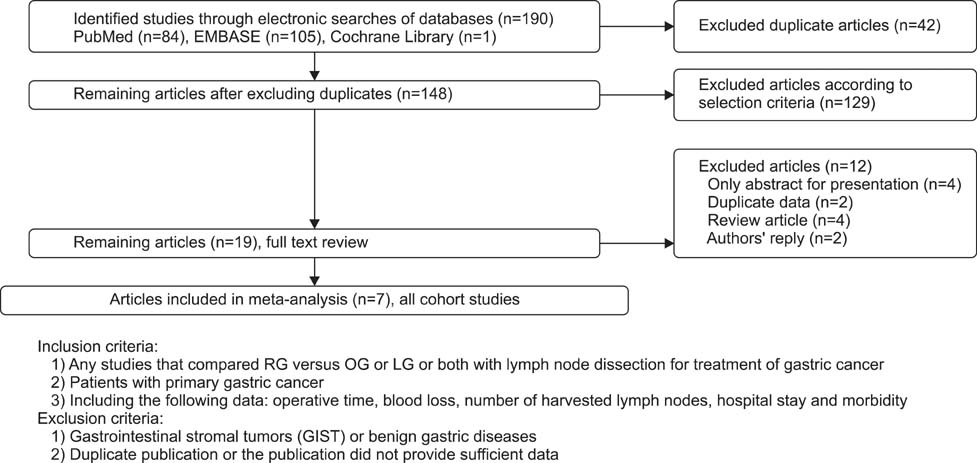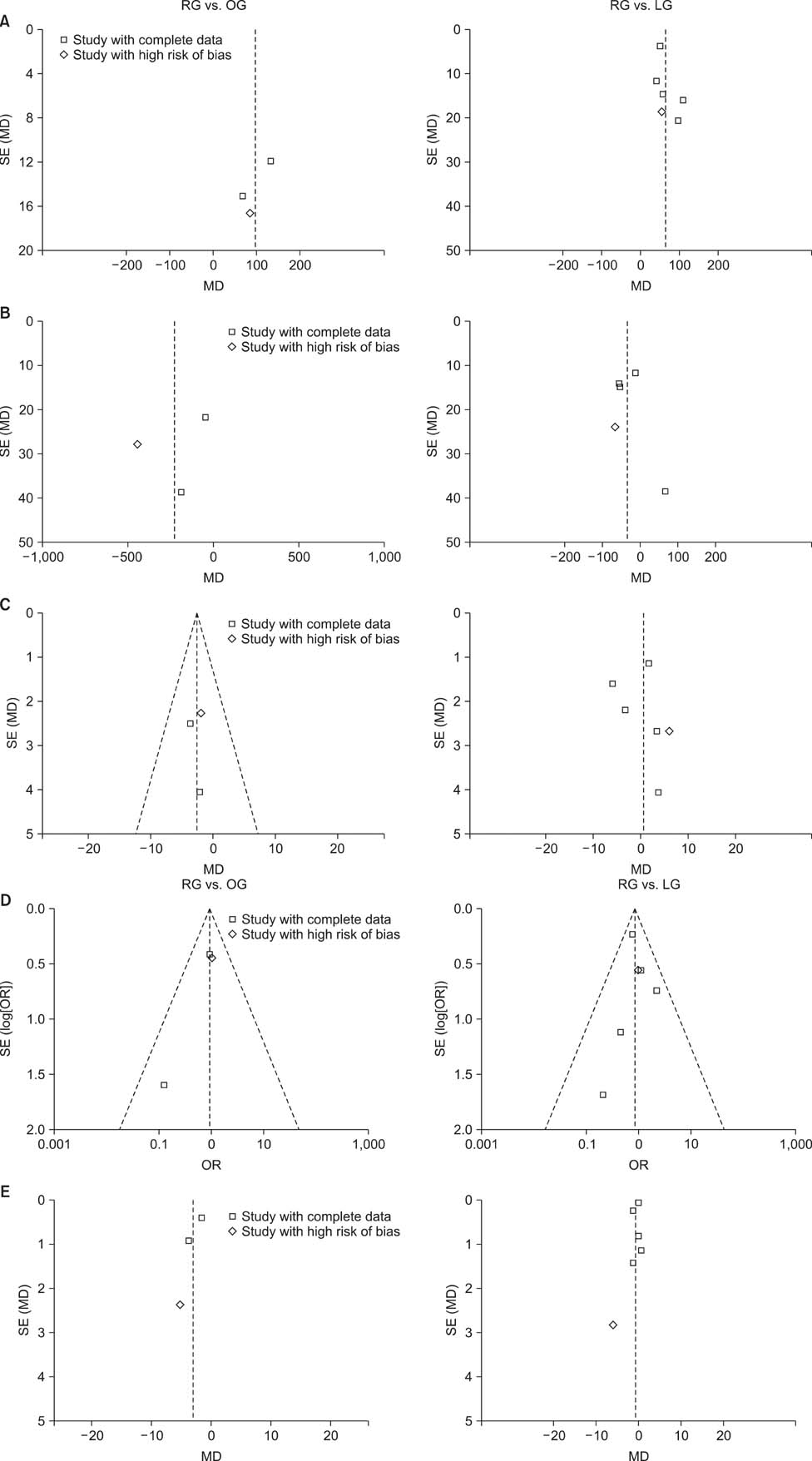J Gastric Cancer.
2013 Sep;13(3):136-148.
Robotic versus Laparoscopic versus Open Gastrectomy: A Meta-Analysis
- Affiliations
-
- 1Department of Surgery, Yonsei University College of Medicine, Seoul, Korea. wjhyung@yuhs.ac
- 2Robot and MIS Center, Severance Hospital, Yonsei University Health System, Seoul, Korea.
- 3Biostatistics Collaboration Unit, Yonsei University College of Medicine, Seoul, Korea.
- 4Department of General and Oncologic Surgery, SS Antonio and Biagio Hospital, Alessandria, University of Turin, Turin, Italy.
Abstract
- PURPOSE
To define the role of robotic gastrectomy for the treatment of gastric cancer, the present systematic review with meta-analysis was performed.
MATERIALS AND METHODS
A comprehensive search up to July 2012 was conducted on PubMed, EMBASE, and the Cochrane Library. All eligible studies comparing robotic gastrectomy versus laparoscopic gastrectomy or open gastrectomy were included.
RESULTS
Included in our meta-analysis were seven studies of 1,967 patients that compared robotic (n=404) with open (n=718) or laparoscopic (n=845) gastrectomy. In the complete analysis, a shorter hospital stay was noted with robotic gastrectomy than with open gastrectomy (weighted mean difference: -2.92, 95% confidence interval: -4.94 to -0.89, P=0.005). Additionally, there was a significant reduction in intraoperative blood loss with robotic gastrectomy compared with laparoscopic gastrectomy (weighted mean difference: -35.53, 95% confidence interval: -66.98 to -4.09, P=0.03). These advantages were at the price of a significantly prolonged operative time for both robotic gastrectomy versus laparoscopic gastrectomy (weighted mean difference: 63.70, 95% confidence interval: 44.22 to 83.17, P<0.00001) and robotic gastrectomy versus open gastrectomy (weighted mean difference: 95.83, 95% confidence interval: 54.48 to 137.18, P<0.00001). Analysis of the number of lymph nodes retrieved and overall complication rates revealed that these outcomes did not differ significantly between the groups.
CONCLUSIONS
Robotic gastrectomy for gastric cancer reduces intraoperative blood loss and the postoperative hospital length of stay compared with laparoscopic gastrectomy and open gastrectomy at a cost of a longer operating time. Robotic gastrectomy also provides an oncologically adequate lymphadenectomy. Additional high-quality prospective studies are recommended to better evaluate both short and long-term outcomes.
Keyword
MeSH Terms
Figure
Reference
-
1. Kitano S, Shiraishi N. Minimally invasive surgery for gastric tumors. Surg Clin North Am. 2005; 85:151–164.
Article2. Kitano S, Iso Y, Moriyama M, Sugimachi K. Laparoscopy-assisted Billroth I gastrectomy. Surg Laparosc Endosc. 1994; 4:146–148.3. Kim HH, Hyung WJ, Cho GS, Kim MC, Han SU, Kim W, et al. Morbidity and mortality of laparoscopic gastrectomy versus open gastrectomy for gastric cancer: an interim report--a phase III multicenter, prospective, randomized Trial (KLASS Trial). Ann Surg. 2010; 251:417–420.
Article4. Kim YW, Baik YH, Yun YH, Nam BH, Kim DH, Choi IJ, et al. Improved quality of life outcomes after laparoscopy-assisted distal gastrectomy for early gastric cancer: results of a prospective randomized clinical trial. Ann Surg. 2008; 248:721–727.
Article5. Katai H, Sasako M, Fukuda H, Nakamura K, Hiki N, Saka M, et al. JCOG Gastric Cancer Surgical Study Group. Safety and feasibility of laparoscopy-assisted distal gastrectomy with suprapancreatic nodal dissection for clinical stage I gastric cancer: a multicenter phase II trial (JCOG 0703). Gastric Cancer. 2010; 13:238–244.
Article6. Wei HB, Wei B, Qi CL, Chen TF, Huang Y, Zheng ZH, et al. Laparoscopic versus open gastrectomy with D2 lymph node dissection for gastric cancer: a meta-analysis. Surg Laparosc Endosc Percutan Tech. 2011; 21:383–390.
Article7. Park do J, Han SU, Hyung WJ, Kim MC, Kim W, Ryu SY, et al. Korean Laparoscopic Gastrointestinal Surgery Study (KLASS) Group. Long-term outcomes after laparoscopy-assisted gastrectomy for advanced gastric cancer: a large-scale multicenter retrospective study. Surg Endosc. 2012; 26:1548–1553.
Article8. Giulianotti PC, Coratti A, Angelini M, Sbrana F, Cecconi S, Balestracci T, et al. Robotics in general surgery: personal experience in a large community hospital. Arch Surg. 2003; 138:777–784.9. Hyung WJ. Robotic surgery in gastrointestinal surgery. Korean J Gastroenterol. 2007; 50:256–259.10. Gutt CN, Oniu T, Mehrabi A, Kashfi A, Schemmer P, Büchler MW. Robot-assisted abdominal surgery. Br J Surg. 2004; 91:1390–1397.
Article11. Baek SJ, Lee DW, Park SS, Kim SH. Current status of robot-assisted gastric surgery. World J Gastrointest Oncol. 2011; 3:137–143.
Article12. Wall J, Marescaux J. Robotic gastrectomy is safe and feasible, but real benefits remain elusive. Arch Surg. 2011; 146:1092.
Article13. Lanfranco AR, Castellanos AE, Desai JP, Meyers WC. Robotic surgery: a current perspective. Ann Surg. 2004; 239:14–21.14. Buchs NC, Bucher P, Pugin F, Morel P. Robot-assisted gastrectomy for cancer. Minerva Gastroenterol Dietol. 2011; 57:33–42.15. Hashizume M, Sugimachi K. Robot-assisted gastric surgery. Surg Clin North Am. 2003; 83:1429–1444.
Article16. Wells GA, Shea B, O'Connell D, Peterson J, Welch V, Losos M, et al. The Newcastle-Ottawa Scale (NOS) for assessing the quality of non-randomized studies in meta-analyses. Accessed 18 June, 2007. Available from: http://www.ohri.ca/programs/clinical_epidemiology/oxford.asp/.17. Kim MC, Heo GU, Jung GJ. Robotic gastrectomy for gastric cancer: surgical techniques and clinical merits. Surg Endosc. 2010; 24:610–615.
Article18. Pugliese R, Maggioni D, Sansonna F, Costanzi A, Ferrari GC, Di Lernia S, et al. Subtotal gastrectomy with D2 dissection by minimally invasive surgery for distal adenocarcinoma of the stomach: results and 5-year survival. Surg Endosc. 2010; 24:2594–2602.
Article19. Yoon HM, Kim YW, Lee JH, Ryu KW, Eom BW, Park JY, et al. Robot-assisted total gastrectomy is comparable with laparoscopically assisted total gastrectomy for early gastric cancer. Surg Endosc. 2012; 26:1377–1381.
Article20. Woo Y, Hyung WJ, Pak KH, Inaba K, Obama K, Choi SH, et al. Robotic gastrectomy as an oncologically sound alternative to laparoscopic resections for the treatment of early-stage gastric cancers. Arch Surg. 2011; 146:1086–1092.
Article21. Eom BW, Yoon HM, Ryu KW, Lee JH, Cho SJ, Lee JY, et al. Comparison of surgical performance and short-term clinical outcomes between laparoscopic and robotic surgery in distal gastric cancer. Eur J Surg Oncol. 2012; 38:57–63.
Article22. Caruso S, Patriti A, Marrelli D, Ceccarelli G, Ceribelli C, Roviello F, et al. Open vs robot-assisted laparoscopic gastric resection with D2 lymph node dissection for adenocarcinoma: a case-control study. Int J Med Robot. 2011; 7:452–458.
Article23. Huang KH, Lan YT, Fang WL, Chen JH, Lo SS, Hsieh MC, et al. Initial experience of robotic gastrectomy and comparison with open and laparoscopic gastrectomy for gastric cancer. J Gastrointest Surg. 2012; 16:1303–1310.
Article24. Schreiber GB, Busch MP, Kleinman SH, Korelitz JJ. The risk of transfusion-transmitted viral infections. The Retrovirus Epidemiology Donor Study. N Engl J Med. 1996; 334:1685–1690.
Article25. Hyung WJ, Noh SH, Shin DW, Huh J, Huh BJ, Choi SH, et al. Adverse effects of perioperative transfusion on patients with stage III and IV gastric cancer. Ann Surg Oncol. 2002; 9:5–12.
Article26. Maeta M, Shimizu N, Oka A, Kondo A, Yamashiro H, Tsujitani S, et al. Perioperative allogeneic blood transfusion exacerbates surgical stress-induced postoperative immunosuppression and has a negative effect on prognosis in patients with gastric cancer. J Surg Oncol. 1994; 55:149–153.
Article27. Siewert JR, Böttcher K, Roder JD, Busch R, Hermanek P, Meyer HJ. Prognostic relevance of systematic lymph node dissection in gastric carcinoma. German Gastric Carcinoma Study Group. Br J Surg. 1993; 80:1015–1018.28. Huang CM, Lin JX, Zheng CH, Li P, Xie JW, Wang JB. Impact of the number of dissected lymph nodes on survival for gastric cancer after distal subtotal gastrectomy. Gastroenterol Res Pract. 2011; 2011:476014.
Article29. Marubini E, Bozzetti F, Miceli R, Bonfanti G, Gennari L. Gastrointestinal Tumor Study Group. Lymphadenectomy in gastric cancer: prognostic role and therapeutic implications. Eur J Surg Oncol. 2002; 28:406–412.
Article30. Lee HK, Yang HK, Kim WH, Lee KU, Choe KJ, Kim JP. Influence of the number of lymph nodes examined on staging of gastric cancer. Br J Surg. 2001; 88:1408–1412.
Article31. Kwon SJ. Evaluation of the 7th UICC TNM staging system of gastric cancer. J Gastric Cancer. 2011; 11:78–85.
Article32. Dicken BJ, Bigam DL, Cass C, Mackey JR, Joy AA, Hamilton SM. Gastric adenocarcinoma: review and considerations for future directions. Ann Surg. 2005; 241:27–39.33. Xiong B, Ma L, Zhang C. Robotic versus laparoscopic gastrectomy for gastric cancer: a meta-analysis of short outcomes. Surg Oncol. 2012; 21:274–280.
Article
- Full Text Links
- Actions
-
Cited
- CITED
-
- Close
- Share
- Similar articles
-
- Current status of robotic gastrectomy for gastric cancer: A review of recent randomized controlled trials
- Robotic Roux-en-Y Gastric Bypass and Robotic Sleeve Gastrectomy for Morbid Obesity: Case Reports
- Robotic versus laparoscopic revisional bariatric surgeries: a systematic review and meta-analysis
- Robotic Gastrectomy: The Current State of the Art
- Risk Factors of Postoperative Pancreatic Fistula in Curative Gastric Cancer Surgery





